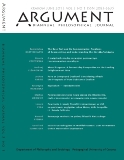Kapitalizm - narodziny idei
Capitalism: the birth of an idea
Author(s): Katarzyna HaremskaSubject(s): Philosophy
Published by: Wydawnictwo Uniwersytetu Komisji Edukacji Narodowej w Krakowie
Keywords: Adam Smith; Enlightenment; free market; private property; philosophy of capitalism; Wealth of Nations; invisible hand; laissez-faire; economic freedom
Summary/Abstract: Amongst the Enlightenment’s emancipatory slogans was a call for the liberation of economic energy, a call that was most fully expressed by Adam Smith in Inquiry into the Nature and Causes of the Wealth of Nations. Smith provided a final analysis of the mercantilist system that had been prevailing from the beginning of the sixteenth century. By justifying the superiority of the free market economy models, Smith created the intellectual foundations for the capitalist order. He proposed a model for the production and distribution of goods that was based on two pillars: the right to private property and free market institutions. The vision of capitalism created by Smith was a system of power and freedom: a system of individual sovereignty over the world of objects and a system of the free circulation of goods. The combination of these two principles resulted in a coherent system which, when used in practice, has shown remarkable efficiency. Smith’s work proved to be a reliable way to achieve worldly success, one that has worked wherever it was tried out. Capitalism, and the accompanying moral philosophy, was the most commonly pursued idea of the eighteenth century.
Journal: ARGUMENT: Biannual Philosophical Journal
- Issue Year: III/2013
- Issue No: 1
- Page Range: 37-58
- Page Count: 22
- Language: Polish

